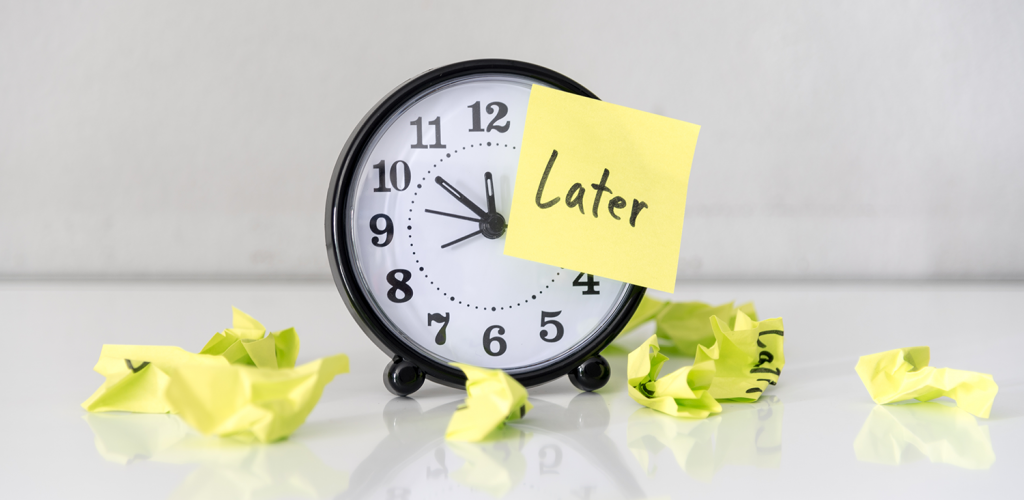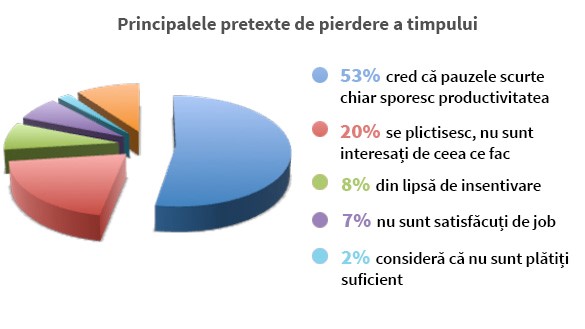
While time itself is not a clear one-dimensional construct, it is a determining factor in the productivity equation. To be effective, psychologists recommend an equal fragmentation of the day into 8 hours of rest, 8 hours of work and 8 hours dedicated to social activities. This is an ideal fragmentation which most of us for various reasons don't adhere to.
If you're wondering who spends the most time at work, you should know that men waste less time than women (91% vs. 87%). In terms of marital status, 91% of single people waste more time, compared to 88% of married people and 85% of divorced people.
While younger people are often accused of wasting the most time, in fact people aged 26 to 39 are more to blame.
Most managers devote a lot of time to their work. This trend results from the implicit assumption that more working hours equal more added value. A fairly simplistic way of thinking because success should be measured in terms of results, not necessarily in terms of the number of allocated working hours. Focusing on results rather than hours leads to a better work-life balance.
Recent voices claim that being able to do whatever we set out to do during a workday is a time management myth. No matter how much philosophers view time as infinite and subjective, the time allocated to work is strictly limited by deadlines and other constraints. This may sound depressing. But if we accept that we can't do everything in such a limited time, we're in a much better position to make explicit choices about what we're going to do. Instead of putting aside the unimportant things (but which need to be done as well), we can intentionally push them and focus our energy on the things that matter most.
What is distracting us at work?
Ironically, at the top of the disruptors is technology (together with related apps and devices). Technology has outgrown our ability of managing time rationally, so a simple notification on our cell phone or computer screen is all it takes to interrupt our thoughts or actions. We are surrounded by cellphones, tablets, phablets, computers, smartwatches - so many disruptive factors, ready to give us the information we need (or not), to disconnect us from the real world and catch us in their virtual trap at any given moment. Thus although we have become wealthier in information, we are poorer in attention.

Paradoxically, studies suggest that wasting time online isn't actually a serious matter and that it should be borne by managers (a conclusion they are obviously not very happy with). The numbers are small enough not to negatively affect productivity, but they come with costs that companies aren't willing to ignore.
Other studies suggest that, on the contrary, employees can become even more productive when they take regular breaks to surf the Internet. Additionally, it seems that the time spent on social media can improve work-related knowledge and skills.
Procrastinating
Even though in an ideal work environment there are no distracting factors, it seems no one is immune to procrastinating. When asked what to do when starting a novel, Ernest Hemingway replied "First you defrost the fridge."...
What do the experts say?
According to Ned Hallowell (psychiatrist, author of 12 books including "Driven to Distraction"), procrastinating work is often a symptom of overload. "We postpone things because we have too much to do," he said. And of course we want to avoid the things we don't like. "A lot of people procrastinate because they're afraid of making a mistake or the difficulty of the task scares them," said Teresa Amabile, Professor of Business Administration at Harvard Business. “Postponing a task doesn't make it go away. Accomplishing it does,” Hallowell adds.
Creativity takes time and space
The #1 attribute a CEO looks for in employees (according to an IBM survey on more than 1,500 executives in 33 industries and 60 countries) is not discipline, integrity, intelligence or emotional intelligence. It's creativity.
But creativity takes time, so breaks can ultimately be a necessary condition to stimulate it. However, unless you spend a few days wandering the forests for new ideas, how could you buy time to be creative?
• by integrating observation into daily activities
• by getting a variety of sources of inspiration and ideas (online and offline)
• taking short walks or exercising (even in the office)
• meditating (to be able to manage the “storm” outside of us, we must calm our inner “storm”)
It was proven that employees who spend 15 minutes at the end of their workday thinking about how their day went at work have been shown to perform 25% better after just 10 days of meditation, compared to those who don't have this habit. At the same time they are happier, more productive, and have a much lower burnout rate.
Is time money?
A lot of research on the well-being at the workplace substantially regard high incomes, money. But time appears to be a much more critical resource when it comes to the employees' happiness.
Numerous experiments seemed to have an interesting effect: when people donate money, they feel wealthier despite the fact that they have just given away a part of their income. As counterintuitive as it may sound, the same thing happens with time: although, technically, people have less time when they allocate part of their resource to others, the result is a positive one because these people feel more efficient, more capable, more competent. Ironically, when you give someone your time, you feel that your time is longer and you can accomplish more. Researchers recommend taking 2 breaks of 15 minutes each that we should offer to other people in the office.
Therefore, the time spent in the office is particularly important for the organizational culture. It is not an inexhaustible resource, as it may seem, so it should be exploited in a sustainable manner. As Peter Drucker said "Until we can manage time, we can manage nothing else."







